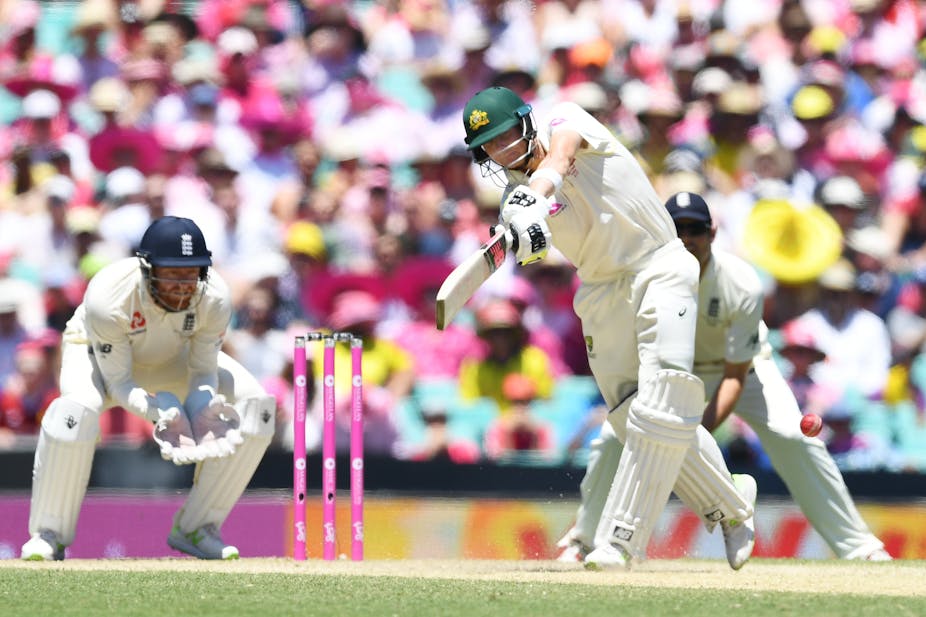On the face of it, there is much to celebrate about Australian cricket right now. The sport has money to burn thanks to recent large pay-TV deals, the Big Bash has strong TV ratings; the women’s cricket team is one of the most successful and highly regarded Australian sporting teams. There has been a surge in junior participation, and many Australians still regard it as our national sport – it is certainly the dominant sport of the summer.
By contrast, cricket in the media is lurching from one crisis to another, with the fallout from the now-infamous ball-tampering episode still reverberating. Yesterday, the sport was dealt another blow.
An independent review of Cricket Australia’s culture was released, concluding that “winning without counting the costs” was largely responsible for the recent ball-tampering scandal and sledging – the on-field verbal abuse and taunting – that has been an entrenched habit of the Australian team for decades.
Read more: Just not cricket: why ball tampering is cheating
The review found the sport was riddled with cultural problems that exerted so much exerted pressure to win that it manifested in cheating and sledging, covertly sanctioned by the administrators. With 42 recommendations, it is clear Cricket Australia needs to change.
The biggest cultural issue for the sport at the moment is sledging, and one of the recommendations calls for cricket’s anti-harrassment code to address abusive behaviour.
While niggling a player might have been an acceptable part of the game, sledging has reached a point where a strict code of ethics needs to be drawn up and adhered to. While this may take away some of the unique nature of the sport, in the long run it will bring the focus back to the play.
Sledging matters because it is a type of cheating. The rise in cheating, whether it be via match-fixing or sledging, is linked to the rise in commercialisation and gambling in sport.
Australian cricket has formed commercial relationships with major sport betting agencies and an official partnership with Bet365. There have been numerous accusations regarding international match-fixers. And the ball-tampering scandal has confirmed that Australians no longer hold the moral high ground.
The relentless pressure to win has infected the sport at all levels. Sledging is but one of the symptoms.
Why does this matter so much to Australians? A clue may lie in what else is going on: a recent bank inquiry, fears related to immigration, contempt for politicians, growing distrust of public institutions, poor performance and declines in international educational testing, wage stagnation and declines (despite a world record run on economic growth), concern over high house prices and power bills. In 2018, Australians have much to be anxious and angry about.
Read more: Can the cricketers banned for ball tampering ever regain their hero status? It's happened before
Cricket has always been held above everyday concerns, and has been a source of national pride and a salve in times of fear. Throughout the history of colonial Australia, cricket has been a source of inspiration, an institution that has provided strong links to our communities (school, geographical district, state and territories) and helped define Australian identity.
Modern Australians’ first organised sport in both schools and the community setting was cricket. Our first sporting wins against the “home country” – England – were in cricket Test matches. Cricket was responsible for giving us legitimacy.
Our best cricketers became heroes. Generations looked upon Don Bradman, Dennis Lillee, Steve Waugh and Mark Taylor as role models. It was the hegemonic sport and the cricketers best represented what Australian masculinity was about. If you played the sport, you played in a tough way (even though it is not a contact sport) within the highly revered rules; cricket could help you learn that gracious defeat is as admirable as victory.
Also, especially from about 1990 onwards, the Australian men’s team was outstanding. They won Test series and one-dayers with continued all-round brilliance, producing some of the greatest players the game has ever seen.
But, in the past few years, Australian cricket’s legitimacy has waned. Many of us who love the sport and all it represents have felt disillusioned by recent events at the elite level. This was confirmed to us yesterday with the report – which, thankfully, did not sugar-coat the diagnosis.
So what is the cure? A revised, strict and well-policed ethical code for staff and players will not be enough. Cricket needs to work with commercial partners, or abandon them if they can’t meet high ethical standards too.
Commercial and betting agendas create pressures to cheat, yet Sport 2030, our national plan for sport, under the banner “strengthening the sector’s integrity” suggests:
organisations… adopt a more efficient, model of governance which can best position sports to be able to drive greater commercial outcomes, reduce reliance on funding, increase autonomy and support innovation.
And there is the dilemma.

